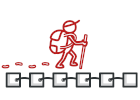
Itérateur en Python
L’Itérateur est un patron de conception comportemental qui permet de parcourir une structure de données complexe de façon séquentielle sans exposer ses détails internes.
Grâce à l’itérateur, les clients peuvent parcourir les éléments de différentes collections de la même manière en utilisant une seule interface.
Complexité :
Popularité :
Exemples d’utilisation : L’itérateur est très répandu en Python. Il est utilisé dans de nombreux frameworks et bibliothèques pour fournir une méthode de parcours standard de leurs collections.
Identification : L’itérateur peut facilement être reconnu grâce aux méthodes de parcours (comme next, previous et d’autres). Le code client qui utilise les itérateurs n’a pas forcément d’accès direct aux collections parcourues.
Exemple conceptuel
Dans cet exemple, nous allons voir la structure de l’Itérateur. Nous allons répondre aux questions suivantes :
- Que contiennent les classes ?
- Quels rôles jouent-elles ?
- Comment les éléments du patron sont-ils reliés ?
main.py: Exemple conceptuel
from __future__ import annotations
from collections.abc import Iterable, Iterator
from typing import Any
"""
To create an iterator in Python, there are two abstract classes from the built-
in `collections` module - Iterable,Iterator. We need to implement the
`__iter__()` method in the iterated object (collection), and the `__next__ ()`
method in theiterator.
"""
class AlphabeticalOrderIterator(Iterator):
"""
Concrete Iterators implement various traversal algorithms. These classes
store the current traversal position at all times.
"""
"""
`_position` attribute stores the current traversal position. An iterator may
have a lot of other fields for storing iteration state, especially when it
is supposed to work with a particular kind of collection.
"""
_position: int = None
"""
This attribute indicates the traversal direction.
"""
_reverse: bool = False
def __init__(self, collection: WordsCollection, reverse: bool = False) -> None:
self._collection = collection
self._reverse = reverse
self._sorted_items = None # Will be set on first __next__ call
self._position = 0
def __next__(self) -> Any:
"""
Optimization: sorting happens only when the first items is actually
requested.
"""
if self._sorted_items is None:
self._sorted_items = sorted(self._collection._collection)
if self._reverse:
self._sorted_items = list(reversed(self._sorted_items))
"""
The __next__() method must return the next item in the sequence. On
reaching the end, and in subsequent calls, it must raise StopIteration.
"""
if self._position >= len(self._sorted_items):
raise StopIteration()
value = self._sorted_items[self._position]
self._position += 1
return value
class WordsCollection(Iterable):
"""
Concrete Collections provide one or several methods for retrieving fresh
iterator instances, compatible with the collection class.
"""
def __init__(self, collection: list[Any] | None = None) -> None:
self._collection = collection or []
def __getitem__(self, index: int) -> Any:
return self._collection[index]
def __iter__(self) -> AlphabeticalOrderIterator:
"""
The __iter__() method returns the iterator object itself, by default we
return the iterator in ascending order.
"""
return AlphabeticalOrderIterator(self)
def get_reverse_iterator(self) -> AlphabeticalOrderIterator:
return AlphabeticalOrderIterator(self, True)
def add_item(self, item: Any) -> None:
self._collection.append(item)
if __name__ == "__main__":
# The client code may or may not know about the Concrete Iterator or
# Collection classes, depending on the level of indirection you want to keep
# in your program.
collection = WordsCollection()
collection.add_item("B")
collection.add_item("A")
collection.add_item("C")
print("Straight traversal:")
print("\n".join(collection))
print("")
print("Reverse traversal:")
print("\n".join(collection.get_reverse_iterator()), end="")
Output.txt: Résultat de l’exécution
Straight traversal:
A
B
C
Reverse traversal:
C
B
A